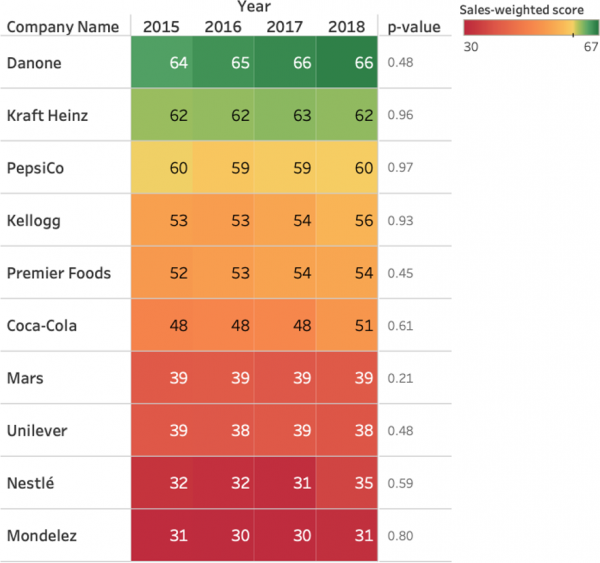‘Little evidence’ voluntary targets spur reformulation: ‘The food and beverage industry has to step up’

Poor diet is linked to obesity and associated NCDs, such as type 2 diabetes and cardiovascular disease. This leads to a substantial burden on health systems. According to Public Health England (PHE), obesity and related diseases cost the NHS around £6.1bn a year, with the cost to wider society placed at £27bn.
In an effort to tackle this, PHE introduced voluntary targets to reduce sugar, salt and calories in 2014. Subsequent policy has built on this foundation, including the country’s childhood obesity programme and the planned introduction of tougher restrictions to HFSS marketing and promotions.
However, new research questions the efficacy of this approach. UK policies setting voluntary reformulation targets have failed to deliver improvements in the nutritional value of products on sale in the country, a paper published in PLOS ONE suggests.
The study, let by Dr Lauren Bandy and colleagues at the University of Oxford's Nuffield Department of Population Health, evaluated products made by the top ten food and beverage companies over a four-year period, between 2015 and 2018.
“We saw little evidence that the recommended current targets have made a significant difference and we believe that without more policy action and a transparent monitoring and evaluation system, it is unlikely there will be meaningful change,” Dr Bandy observed.
What progress has been made?
The researchers used the UK nutrient profiling model to assess nutritional content. “This overall nutrient profile includes multiple dimensions. It’s a good way of looking at company portfolios rather than just looking at single nutrients,” co-author Professor Mike Rayner, of the Nuffield Department of Population Health at the University of Oxford, told FoodNavigator.
Overall, there was a ‘small increase’ in the number of products classified as healthy: 46% in 2015 compared to 47% in 2018. There was also an increase in sales that were considered healthy, which rose from 44% in 2015 to 51% in 2018. The researchers said that this was largely due to sugar reduction efforts in the soft drinks category ahead of the 2018 introduction of a sugar levy.
Dr Bandy said that progress made in soft drinks showed what could be achieved through reformulation – as well as the effectiveness of financial policy levers to spur action.
“We know that if we are to see the reduction in diet-related disease that is needed in the population, the food and beverage industry has to step up and improve the nutritional quality of its products. Our study shows that so far, not much has been done to improve the healthiness of household brands owned by top companies, with the exception of soft drinks, which are subject to a tax that has encouraged lower sugar levels. The current focus on voluntary, single-nutrient reformulation targets might want to be reconsidered by policy makers,” she suggested.
Of the top five brands sold by each of the ten companies, only six improved their nutritional score by 20% or more, the researchers stressed.
‘It’s about changing the types of products people sell’
Looking at the ten largest food makers in the UK, the researchers found ‘no change’ in the nutrient profiling score of products over time. However, one company, Kellogg, showed a ‘small overall improvement’. This was driven by reducing sugar in two products: Coco Pops and Special K.
“I’m slightly surprised by the lack of progress given the amount of news coverage obesity receives,” Professor Rayner said. “We’ve made good progress on saturated fat intakes… things can change but over a long time. In order to make progress, we need stronger incentives around taxes and rules about marketing.”
Dairy giant Danone was found to be the ‘best’ performer, followed by beans producer Kraft Heinz and snack-to-soft drinks giant PepsiCo. Bringing up the rear were Mondelez International, Nestlé and Unilever.

“Companies score better if they have a more varied portfolio. In the [company] rankings you are looking at the overall portfolio,” Professor Rayner explained. “It isn’t just about reformulation, it’s about changing the types of products people sell.”
However, Nestlé suggested that the study rankings failed to take into account a number of the company’s categories when assessing the healthiness of its overall portfolio. According to the company, the study did not include a ‘large proportion of our portfolio’ such as baby food, water and coffee.
Nestlé also stressed the progress it has made in challenging categories like confectionery where ‘significant work’ to reformulate has taken place. Public Health England’s progress reports showed a 2% sugar reduction for KitKat SKUs in year 1; a 1.6% sugar reduction for the two-finger KitKat and a 7.4% cut in sugar for KitKat Chunky in year 2; and a 1-2% reduction in sugar across the KitKat range in year 3.
A Nestlé spokesperson told FoodNavigator that the company has made ‘notable’ progress in reformulation efforts and, since 2015, the company claimed to have removed around 66bn calories and 3.7bn teaspoons of sugar from its UK portfolio. “We have also significantly reduced the salt and saturated fat content in our products, and have been working toward the Government Salt Targets since they were first developed. The majority of our products meet the 2017 and 2024 Public Health England Salt Reduction Targets,” the spokesperson noted.
The company is also working to add more vegetables and whole grains to its portfolio while expanding in categories like plant-based to ‘support a balanced, healthy and sustainable diet’.
“These are considerable achievements, despite the inherent limits to reformulating specific food categories without compromising on taste and quality. We know we need to do more, and that’s why we continue to invest heavily in R&D and product development to overcome these challenges. Our focus remains on creating healthier choices across all of Nestlé’s product categories.”
The Food and Drink Federation, the industry body representing UK food and beverage producers also flagged what it characterized as an industry-wide commitment to improving the health profile of food and beverages.
“Reformulation takes time and our commitment as an industry to the voluntary reformulation programmes cannot be doubted. The paper itself acknowledges that companies’ work on salt targets have been ongoing for decades and we are committed to this for the long haul,” FDF Chief Scientific Officer, Kate Halliwell, said.
“Compared to 2015, FDF members' products now contribute 11% fewer calories, 11% fewer sugars, and 14% less salt to the average shopping basket,” she claimed, citing Kantar data.
“The UK reformulation programmes – which have always been voluntary - are regarded world-leading. In a global comparison, packaged food and drink in the UK is ranked the healthiest, with the lowest sugar and energy content [according to one study]. Food and drink manufacturers efforts should be recognised and celebrated, as businesses continue their efforts towards the latest ambitious targets.”
In contrast, Professor Rayner stressed the importance of assessing company performance on an independent basis. “You’ve got to look at objective, independent information on what companies are doing versus what they say they are doing. This report shows they aren’t doing very much.”
Source
Assessing the healthiness of UK food companies’ product portfolios using food sales and nutrient composition data
PLOS ONE
DOI: https://doi.org/10.1371/journal.pone.0254833
Lauren Kate Bandy, Sven Hollowell, Richard Harrington, Peter Scarborough, Susan Jebb, Mike Rayner



















